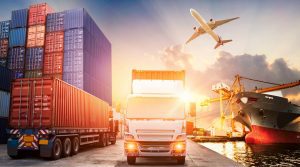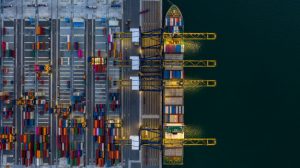
Transport enterprises of Ukraine (excluding the territory of the Autonomous Republic of Crimea and Sevastopol, as well as part of the JFO zone) in January-August 2020 reduced transportation of goods by 13.4% compared to the same period in 2019, to 382.2 million tonnes, the State Statistics Service has reported.
According to the report, the freight turnover of carriers for the specified period decreased by 17.1%, to 185.7 billion tonne-kilometers.
According to statistics, for the eight months of this year, 196.7 million tonnes of cargo were transported by rail in domestic traffic and for export, which is 5.3% less than in January-August 2019. Some 119.4 million tonnes (23.5% less) were transported by road, 3.3 million tonnes (12.4% less) by water, 62.7 million tonnes (15% less) by pipeline, and 100,000 tonnes by air (10.7% less).

Participants in the market where used cars from the United States are sold intend to create the Ukrainian Association of Transport, Service and Repair with the aim of participating in making legislative changes in the car market in order to avoid initiatives that create obstacles to buying inexpensive cars and raise their prices.
“We plan to make an influential body that will participate in drafting bills, amendments and additions related to the car industry, in discussions of planned legislative changes that may restrict the sale of cars with the relevant ministries,” Head of the association, co-founder of Columb Trade Pavlo Kazaryan said at a press conference at Interfax-Ukraine on Tuesday.
According to lawyer Roman Voloshyn, the main goal of the association is to simplify business activities and opportunities for buyers as much as possible in order to reduce the cost of registration and purchase of such cars.

He said that the need to create an association arose after the car market participants managed to achieve the abolition of the planned ban on imports of cars to Ukraine after a road accident, which a draft government resolution developed by the Ministry of Internal Affairs and published on its website contained.
After a public outcry, the government decided to abandon this idea of the Ministry of Internal Affairs, and the recently published updated text of the resolution on the registration of the vehicle no longer contains “scandalous provisions” prohibiting registrations of cars marked with the recycling label, as well as the need to translate accompanying documents into the state language with an apostille.
Meanwhile, as noted by the co-founder of the association, Volodymyr Kovel, negative changes have occurred since the publication of the resolution (February 2020), in particular, according to the surveys they conducted, about 72% of potential customers refused to buy a car from the United States in order to avoid risk and they overpaid 30% of the cost for the purchase of a car from Georgia and Europe or bought a car in a condition that was not desired.
In addition, he said that taxi services operating hybrids and electric cars received less money from investors for the purchase of cars and the development of the business, large contracts for the supply of spare parts from China, the United States and Germany were canceled due to the risk of closing the business, some companies were closed because customers stopped to sign transactions due to confusion, and dozens of service stations could go bankrupt, as they took large loans for business development.
“When we united to solve the problem, created a petition on the president’s website, which received more than 18,000 votes, many companies joined us, and we were heard by the state, we realized that it was necessary to create an association that would participate in the development of legislative changes, both taking into account the wishes of business and the authorities, that is, to find a compromise,” Kazaryan said.
According to him, the association intends to unite companies selling used cars from the United States, forwarding and brokerage companies, suppliers of spare parts, service stations and local carriers, as well as transport companies and taxi services.
“Any intention to amend the legislation affects the business, the pricing policy, and its entrepreneurs are afraid of such rumors in the market even more than inspections. The association is also needed in order to bring as many market participants to work legally and explain advantages of such work. I want about 85% of companies to work openly in a couple of years,” Voloshyn said.
According to him, after the publication of the draft resolution, the demand for cars from the United States in Ukraine fell due to the fact that people did not understand whether it was worth buying now, how to redo the documents, whether it would be registered.
“After the changes were removed, the percentage of purchases started to grow by 5-10% every day, and we have already reached the average monthly purchases that were before,” he said.
Asked about the impact of the situation with the spread of coronavirus in this country and lockdown restrictions on the business of selling cars (with a recycling label) from the United States, Kovel said that, of course, after the phases of falling prices for cars meant for recycling and the devastation of the market, prices increased, logistics due to temporary quarantine in ports has become more complicated.
“However, now the situation in the United States is leveling off, and prices are returning to the level before the COVID-19 pandemic. That is, there was no big decline in this area, and the expected changes in legislation brought much more losses,” Kovel said.
He recalled that taking into account monthly deliveries of about 10,000 cars from the United States, $327.8 million annually comes to the budget, and the total volume of the market of cars from the United States, taking into account all related services, is $836.64 million.
He named the Volkswagen Jetta and Passat cars assembled in Mexico, as well as the Ford Focus and Fusion cars the most popular.

Former U.S. Department of State Special Representative for Ukraine, Kurt Volker, has become an independent member of the board of directors of BGS Rail, which operates in Ukraine, since September 1, U.S.-government funded Radio Free Europe/Radio Liberty has reported.
According to it, BGS Rail is registered in Ukraine. Avia Solutions Group expects Volker’s participation to strengthen the company’s presence in the market.
“By using his vast experience gained in previous positions, we believe that his arrival to the company will further expand Avia Solutions Group’s global reach and strengthen BGS Rail’s position as one of the market’s leading service providers,” the group’s statement reads.
It is noted that Avia Solutions also has in its disposal a comment made by Volker, who points to the opportunity to strengthen the Ukrainian economy in his new work.
“By working with Avia Solutions Group in its development of BGS Rail, I see an opportunity to strengthen Ukraine’s economy, build world-class services, and create jobs for Ukrainian citizens. This goes hand-in-hand with Avia Solutions Group’s global strategy of building world-class services and market position,” he said.
Volker served as Special Representative of the U.S. Department of State for Ukraine in 2017-2019.

The draft general plan of Kyiv includes the construction of an external bypassing railroad from Nizhyn to Korosten directions for passing transit freight traffic which has overloaded the capital’s railway hubs recently.
The press service of Kyiv City State Administration said referring to the municipal organization Kyivgenplan on Wednesday that the main railway development measures include:
– construction of a railway junction at various levels near the Livy Bereh (Left Bank) stop;
– construction of additional running lines on the sections: Kyiv-Demiyivsky – Darnytsia, Zhuliany – Hlevakha, Kyiv – Myronivka;
– closure of 66 low-density line at ten freight stations;
– creation of three transport and storage facilities near Kozhukhivka in Vasylkivsky district, Kalynivka in Brovarsky district, Ukrainka at the facility with new freight districts of the river port;
– closure of freight stations and Kyiv-Tovarny, Kyiv-Dniprovsky yards, Kyiv-Pochaina freight yard, Kyiv-Pasazhyrsky hauling yard and Darnytsia sorting yard.
As reported, the draft general plan of Kyiv also envisages the construction of two new bus stations at Kyiv’s exits and shutdown of the Central Bus Station.

Transport enterprises of Ukraine (excluding the territory of the Autonomous Republic of Crimea and Sevastopol, as well as part of the Joint Forces Operation zone) reduced cargo transportation by 13.1% in January-March 2020 compared to January-March 2019, to 140.7 million tonnes, the State Statistics Service has reported.
According to its data, freight turnover of carriers for the specified period decreased by 14.9%, to 68.853 billion tonne-kilometers.
According to statistics, in the first quarter of 2020, 37.9 million tonnes of cargo were transported by rail in domestic traffic and for exports, which is 4.1% less than in January-March 2019. Some 43.7 million tonnes (17.9% down) were transported by road, 900,000 tonnes (12.6% less) by water, 22.2 million tonnes (27.6% less) by pipeline, and 20,000 tonnes (13.6% less) by airlines.

Ukraine’s transport enterprises in January-November 2019 carried 3.9 billion people, which was 5.6% less than in the same period in 2018, the State Statistics Service has reported.
According to the report, passenger turnover for the reporting period totaled 91.1 billion passenger-kilometers, which was 3.5% more than this figure for January-November last year.
In the 11 months of 2019, some 142.2 million passengers used rail transport (including the commuter rail service), which was 2.1% less than in January-November 2018, and 1.656 billion passengers were carried by road (5.4% less), the State Statistics Service said.
Airlines increased passenger transportation by 10.5%, to 12.8 million people.
In addition, according to the State Statistics Service, in January-November, 571.5 million passengers used trams (a decrease by 7.2% compared to the same period a year earlier), 652.9 million people used the subway (a 1.8% decline), and 864 million used trolleybuses (a 7.6% decrease).
Passenger transportation by water increased by 3.5% compared to January-November 2018, to 700,000 people.
The State Statistics Service says the report does not include data from the temporarily occupied territory of Crimea, Sevastopol and certain districts in Donetsk and Luhansk regions.